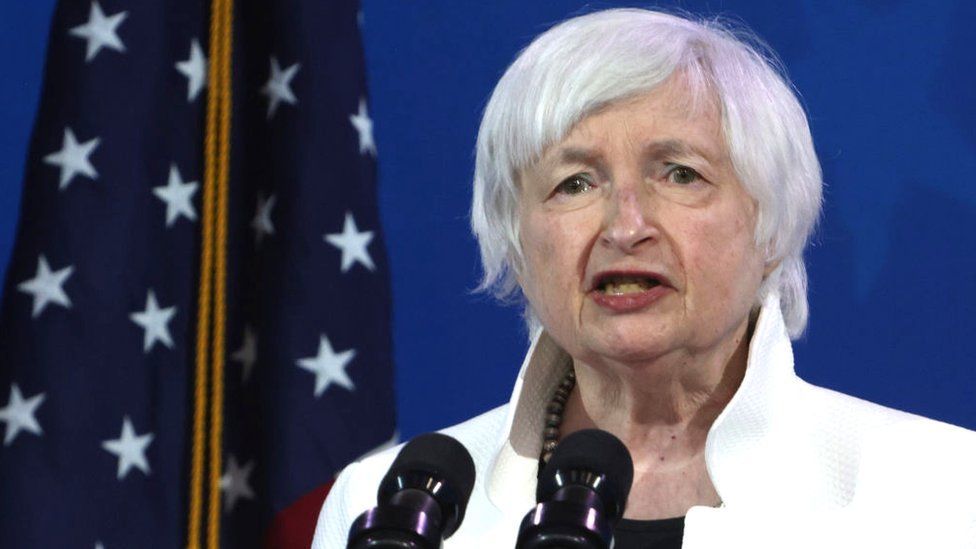U.S. Treasury Secretary Janet Yellen had called for rapid establishment of a creditor committee for Ghana and completion of debt treatment for Zambia
Room for improvement
According to her, there is considerable room for improvement in the international debt restructuring process.
Kamala Harris’ pledge in motion
During her recent state visit to Ghana, Vice-President of the United States of America Kamala Harris pledged the commitment of her country to engage the Paris Club of behalf of Ghana.
IMF-World Bank Annual Spring Meetings
She made the call at a press conference as part of 2023 International Monetary Fund-World Bank Annual Spring Meetings in Washington DC in the United States of America.
$54bn total public debt stock
Ghana’s total public debt stock stands at $54 billion, out of which $28 billion is owed to foreign creditors.
Ghana owes China $1.9bn
Out of Ghana’s $8.5 billion bilateral loans, about $1.9 billion is owed to China.
Ofori-Atta hopeful of bilateral creditors support
Finance Minister Ken Ofori-Atta is hopeful that bilateral creditors will consent to enough debt relief to enable the country to tap into $3 billion IMF loan package agreed last year.
IMF needs Commitments from bilateral creditors
Commitments from bilateral creditors to provide debt relief are often the first step to unlocking an IMF-backed restructuring programme.
Ministers across creditor and debtor countries to meet
This week, ministers across creditor and debtor countries, as well as representatives of private creditors, will convene for the Global Sovereign Debt Roundtable.
Debt treatment process improvements
Yellen said “I look forward to a robust discussion on improvements to the Common Framework process for low-income countries and the debt treatment process more broadly”.
Factors sinking economies
Ballooning inflation, escalating borrowing costs and a strong dollar have made repaying loans and raising money significantly more expensive for dozens of developing nations, pushing several into default.
60% of low-income countries are in or near debt distress
Some 60% of low-income countries are in or near debt distress, but the Group of 20 (G20) common framework set up to help low income countries has failed to deliver quick debt relief.
$2.5-trillion external debt-service costs
Developing nations may need to find as much as $2.5-trillion over five years to meet external debt-service costs as interest rates rise and poorer countries struggle to refinance borrowings.
Double shock for low-income countries
Low-income countries are expected to suffer a double shock from higher borrowing costs and a decline in demand for their exports which could fuel poverty and hunger.
Capital outflows from many low-income countries
Many low-income countries are now facing mounting debt burdens due in part to the higher interest-rate environment, which is also leading to capital outflows from many of the countries most in need of investment.
Debt overhang remains a significant economic headwind
U.S. Treasury Secretary Yellen pointed out that debt overhang remains a significant economic headwind for too many countries.
Zambia’s situation
“I saw this firsthand in Zambia – whose economy has suffered under the weight of default,” she noted.
The U.S. Treasury Secretary acknowledged that more than half of all low-income countries are near or in debt distress.
“We know that the impacts of debt crises do not respect boundaries; they can have cascading effects on the global economy,” she added.
According to her, in the past few weeks, “we have shown that concerted engagement can result in breakthroughs.
“We are encouraged that China has agreed to provide specific and credible financing assurances in the Sri Lanka case.
“This has enabled the IMF to move forward with a financial support and economic reform program.
“It is vitally important that all creditors – including China – now deliver on their commitments. We will also continue to urge action in other critical cases,” she said.
Ambitious reform and fundraising agenda
The World Bank and International Monetary Fund’s spring meetings is underway with an ambitious reform and fundraising agenda likely to be overshadowed by concerns over high inflation, rising geopolitical tension and financial stability.
3% global growth for the next half decade
The fund now expects global growth to remain at close to 3% for the next half decade — its lowest medium-term prediction since the 1990s.
90% of advanced economies will experience slowing growth
The Fund projects that close to 90% of the world’s advanced economies will experience slowing growth this year, while Asia’s emerging markets are expected to see a substantial rise in economic output — with India and China predicted to account for half of all growth.
$1.6bn hole in concessional lending facility for low-income countries
The IMF and World Bank also called on wealthier countries to help plug a $1.6 billion hole in a concessional lending facility for low-income countries that was heavily used during the COVID-19 pandemic.
- Inflation Rate falls marginally to 21.2%in April - 8 May 2025
- Kidnapped victims: Efforts underway to bring them home – CID boss - 8 May 2025
- Thursday, May 8, 2025 Newspaper Headlines - 8 May 2025




